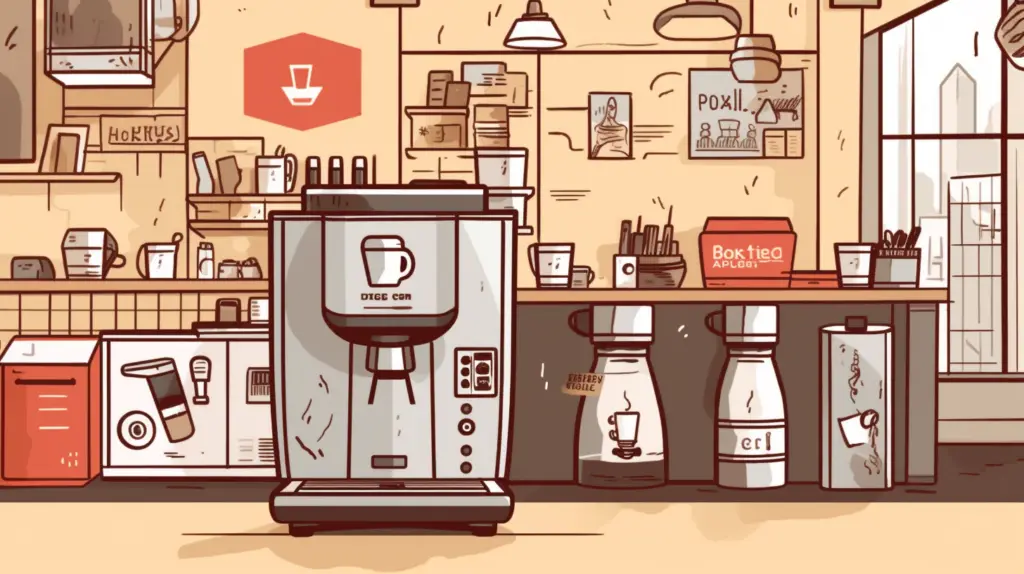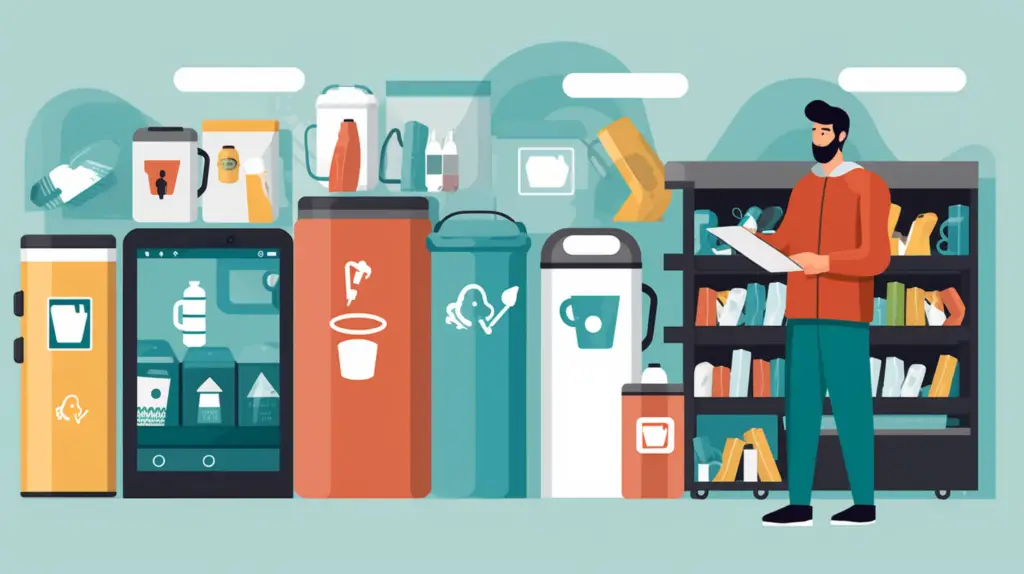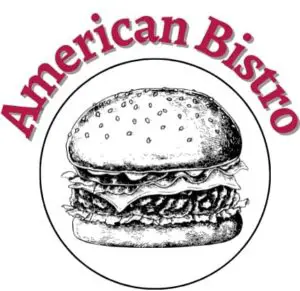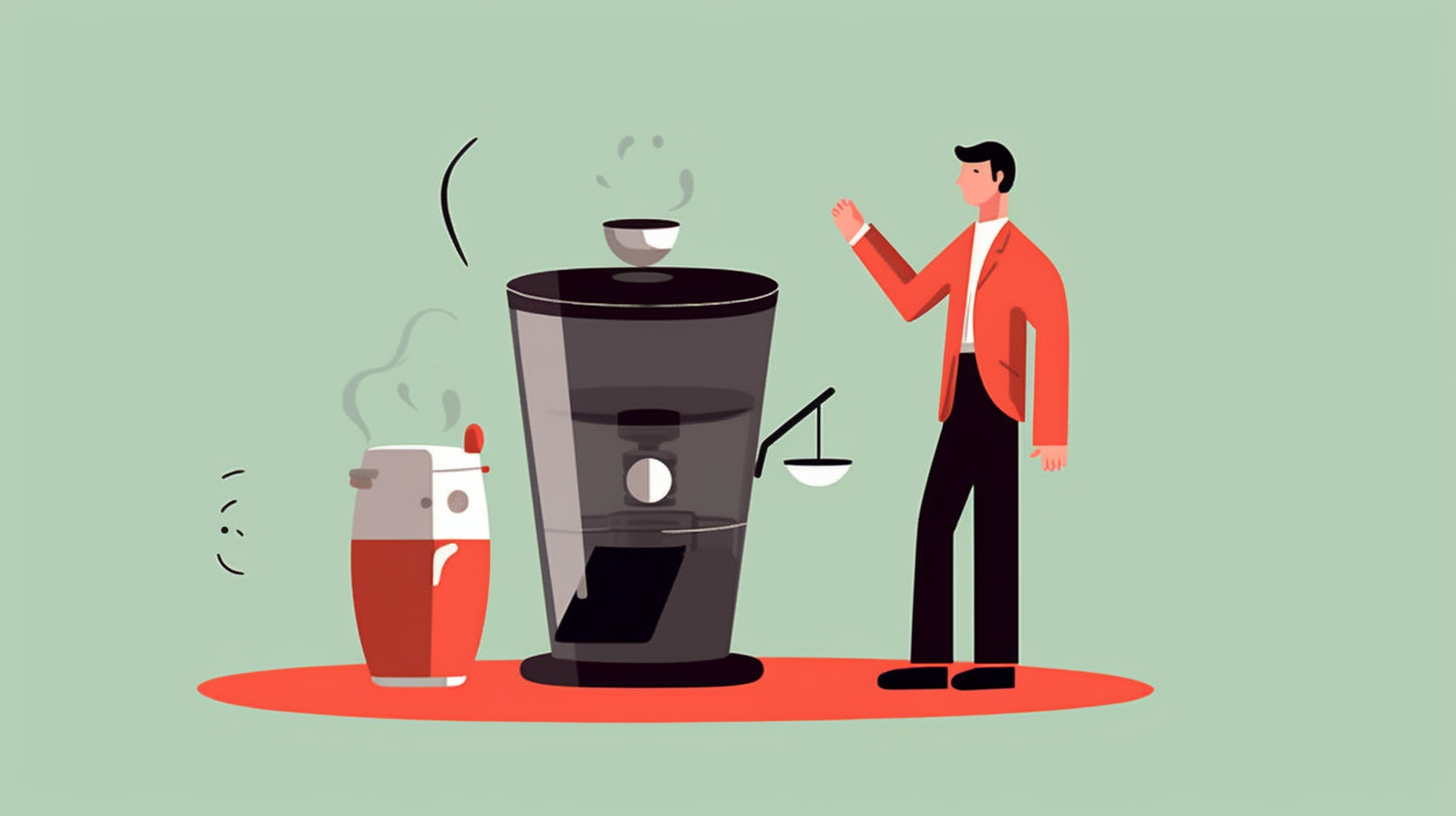Disposing of household appliances can be a challenging task, especially when it comes to electronic devices like coffee makers. Proper disposal is essential to minimize the negative impact on the environment and prevent hazardous waste from harming public health.
In this article, we will discuss various ways to dispose of your coffee maker safely and responsibly.
The process of disposing of a coffee maker involves more than just throwing it in the trash. Many appliances contain harmful chemicals that pose a threat to the environment if not disposed of properly. Therefore, it’s crucial to follow proper guidelines for recycling or disposing of these products.
Understanding these guidelines can help you make informed decisions about how best to get rid of your old coffee maker while reducing environmental damage and promoting sustainability.
Key Takeaways
- Recycling and donating are both sustainable options for properly disposing of a coffee maker.
- Before disposing of a coffee maker, it should be cleaned and dried thoroughly.
- Disposing of appliances in a landfill can have significant negative environmental impacts.
- Seeking professional disposal services for hazardous waste appliances is necessary to minimize harm to the environment and public health.
Understanding the Importance of Proper Disposal for Appliances

Proper disposal of appliances is crucial for ensuring the long-term sustainability of the environment and minimizing negative impacts on human health. As consumers, we must recognize that every appliance we dispose of has an environmental impact.
Modern appliances are made up of a diverse range of materials that can release toxic substances into the air and water when not disposed of responsibly. These substances can cause long-term damage to our natural resources and pose significant threats to public health.
To mitigate these negative consequences, it’s important to understand responsible disposal methods for appliances like coffee makers. One such method is recycling. Recycling allows us to recover valuable materials from old appliances while reducing the volume of waste in landfills. By participating in local recycling programs, we can help minimize the amount of metal, plastic, and other materials that end up polluting our planet.
It’s worth noting that checking for local recycling programs should be a top priority when disposing of coffee makers or any other household appliance. Some cities have specific rules regarding what types of items can be recycled or require residents to schedule a pick-up time for larger items like refrigerators and washing machines. By taking advantage of these services, you’ll not only be doing your part to protect the environment but also complying with local regulations.
Proper disposal methods are essential for mitigating environmental harm caused by discarded household appliances like coffee makers. Recycling is one such method, helping us recover valuable resources while keeping waste out of landfills. It’s crucial to check with local authorities about available recycling programs before disposing of your appliance in order to comply with regulations and reduce your carbon footprint on our planet.
Checking for Local Recycling Programs

Examining the availability of recycling programs in your community can contribute to reducing environmental impact and promoting sustainability. When it comes to disposing of a coffee maker, researching options for proper disposal is crucial. This not only ensures that the appliance is disposed of responsibly but also helps prevent unnecessary waste from ending up in landfills.
One option for responsible disposal is through local recycling programs. These programs are designed to provide residents with a convenient and easy way to dispose of their appliances without harming the environment. In most cases, these programs accept a wide range of appliances, including coffee makers, and often offer pick-up or drop-off services.
To give you an idea of what recycling options may be available in your area, refer to the table below:
| City/State | Recycling Program Name | Accepted Appliances |
|---|---|---|
| Austin, TX | Austin Resource Recovery | Small appliances |
| Denver, CO | Denver Recycles | Large and small appliances |
| Portland, OR | Metro Regional Government | Electronic waste |
It’s important to note that while some cities may have specific guidelines on how to prepare your coffee maker for recycling (such as removing cords or batteries), these details can usually be found on the program’s website or by contacting them directly.
Researching local recycling programs is an effective way to dispose of your coffee maker responsibly and promote sustainability. By choosing this option over simply throwing away your old appliance, you can help reduce waste and ensure that valuable materials are recycled into new products. Next up: guidelines for recycling coffee makers.
Guidelines for Recycling Coffee Makers
When considering the end-of-life management of household appliances, it is important to follow established guidelines for disassembly and recycling in order to promote sustainable resource use and minimize environmental damage. This is particularly true for coffee makers, which are often composed of plastic and electronic components that can be harmful if not properly disposed of.
Recycling benefits both the environment and society by reducing waste, conserving resources, and creating new jobs.
Fortunately, there are eco-friendly options available for those looking to recycle their coffee maker. One option is to locate a local recycling center that accepts small appliances such as coffee makers. Many cities have curbside pickup or drop-off locations specifically designated for electronic waste (e-waste) disposal. It is important to check with your city’s sanitation department or local waste management facility to determine what items they accept.
Another option is to recycle through the manufacturer directly. Many manufacturers offer take-back programs where customers can return their old appliances for proper disposal or refurbishment. Some companies even offer incentives such as discounts on future purchases or free shipping labels for returning products.
Recycling your coffee maker can have significant environmental benefits by reducing waste and promoting sustainable resource use. By following established guidelines for disassembly and recycling you can help ensure that your appliance is properly disposed of in an eco-friendly way.
If you do not wish to recycle your coffee maker, consider donating it to a thrift store or charity instead of throwing it away to further promote sustainability efforts.
Donating Your Coffee Maker to a Thrift Store or Charity
One alternative for sustainable end-of-life management of household appliances is to consider donating them to a thrift store or charity. This provides an opportunity for reuse and reduces waste in landfills. When it comes to coffee makers, there are several thrift store options that accept small appliances, including Goodwill, Salvation Army, and Habitat for Humanity ReStores.
Donating your coffee maker to a thrift store or charity not only promotes sustainability but also supports the community. Many charities provide job training programs and employment opportunities while also raising funds through the sale of donated items. Additionally, some organizations have partnerships with manufacturers that repair and refurbish donated appliances before reselling them at discounted prices.
Before donating your coffee maker, make sure it is clean and in good working condition. Remove any leftover grounds or residue from the carafe and filter basket, then wipe down the exterior with a damp cloth. Some donation centers may have specific requirements for donations, so it’s best to check their website or call ahead before dropping off your appliance.
Transitioning into the subsequent section about cleaning your coffee maker before disposal: Proper cleaning not only ensures that your donation will be accepted but also maintains hygiene standards for future use by others.
Cleaning Your Coffee Maker Before Disposal
To ensure proper end-of-life management of household appliances, it is essential to clean them thoroughly before donating or recycling. This is especially true for coffee makers, which tend to accumulate mineral buildup, oils, and bacteria over time. Cleaning your coffee maker before disposal not only ensures that it will be safe for the next user but also extends its lifespan and reduces the environmental impact of electronic waste.
One effective way to clean your coffee maker is by using a descale solution. Descaling refers to the process of removing mineral deposits from the water reservoir and internal tubing of the machine. Descale solutions are available in most home improvement stores or online retailers and come in either liquid or powder form. Follow the instructions on the package carefully, as different brands may have different concentrations and application methods.
Alternatively, you can use vinegar cleaning as a natural and affordable cleaning agent for your coffee maker. Mix equal parts white distilled vinegar and water in a measuring cup or bowl, then pour it into the water reservoir of your machine. Run a brewing cycle without adding any coffee grounds, then repeat this step two more times with fresh water until there’s no trace of vinegar smell left behind. Vinegar has acetic acid that dissolves mineral buildup while killing off bacteria at the same time.
After cleaning your coffee maker with either descale solution or vinegar cleaning, dry it thoroughly with a clean cloth or let it air dry completely before disposing of it at an electronic waste collection event. While such events may vary depending on where you live, many cities offer free drop-off locations where residents can safely dispose of their old electronics without harming human health or polluting the environment further.
By taking these steps towards responsible disposal practices, we can all do our part in reducing electronic waste pollution while promoting sustainability within our communities.
Next up: Disposing Your Coffee Maker at an Electronic Waste Collection Event…
Disposing of Your Coffee Maker at an Electronic Waste Collection Event
Electronic waste collection events offer a responsible and sustainable option for properly discarding household appliances. These events are organized by local governments or non-profit organizations to collect electronic waste, including coffee makers, from households for proper disposal. By participating in these events, you can ensure that your coffee maker is disposed of in an environmentally friendly way.
One benefit of disposing your coffee maker at an electronic waste collection event is the opportunity to recycle its parts. Many coffee makers contain materials like plastic, glass, and metal that can be recycled. Recycling conserves natural resources, reduces landfill impact, and saves energy required to produce new products.
On the other hand, disposing of your coffee maker in a landfill has significant environmental impacts. Landfills take up valuable space and release greenhouse gases into the atmosphere as organic materials decompose without oxygen. Additionally, when electronics break down in landfills they can leach toxic chemicals into soil and water sources.
If you want to dispose of your old coffee maker responsibly while protecting the environment it’s time to consider taking it to an electronic waste collection event. However, seeking professional disposal services for large or hazardous appliances may be necessary if they cannot be accepted at such events.
Seeking Professional Disposal Services for Large or Hazardous Appliances
When it comes to disposing of your coffee maker, there are various options available. In the previous subtopic, we discussed how one can dispose of their coffee maker at an electronic waste collection event. However, this may not be the most suitable option for large or hazardous appliances.
For those who own larger coffee makers or machines that are considered hazardous waste, seeking professional services for disposal would be a better choice. Hazardous waste includes appliances that contain chemicals such as lead or mercury, which pose a risk to both human health and the environment if not disposed of properly.
There are companies that offer professional disposal services for larger or hazardous appliances. These companies have specialized equipment and facilities to ensure that these items are safely and effectively disposed of. While this option may come with associated costs, it is worth considering when dealing with potentially harmful materials.
It is important to note that improper disposal of appliances can have negative environmental impacts. Choosing professional services ensures that these hazards are minimized, and proper measures are taken to mitigate any potential harm caused by hazardous waste.
- Professional services offer specialized equipment and facilities for safe disposal.
- Disposal costs should be considered when deciding on a method.
- Improper disposal can cause negative environmental impacts.
Frequently Asked Questions
Is it safe to throw my old coffee maker in the trash?
The act of throwing an old coffee maker in the trash may seem like a convenient solution for disposal, but it is not necessarily safe nor responsible.
Such action can have negative environmental impacts, particularly when considering electronic waste.
Improper disposal of electronic waste can result in toxic chemicals leaching into the soil and waterways, harming both human health and wildlife.
Moreover, coffee makers often contain recyclable materials such as plastic and metal that could be repurposed to create new products instead of contributing to landfill waste.
Therefore, proper disposal methods should always be considered to minimize the environmental impact of discarded coffee makers and other electronic devices.
Can I recycle my coffee maker even if it is broken or no longer works?
Recycling options for coffee makers depend on the type of materials used in their manufacturing. Generally, coffee makers can be recycled even if they are broken or no longer work.
By recycling old and unused appliances like coffee makers, we reduce the amount of waste that ends up in landfills and minimize the environmental impact caused by the extraction of raw materials required to manufacture new products.
Many local waste management facilities offer electronic recycling programs that allow people to dispose of their old electronics safely and responsibly.
It is important to properly dispose of electronic appliances such as coffee makers because improperly discarded electronics can release harmful chemicals into the environment.
Are there any coffee maker brands that are easier to recycle than others?
In terms of eco friendly options and sustainable materials, some coffee maker brands are more environmentally conscious than others. Brands that prioritize sustainability often use recycled or renewable materials in their products and have implemented initiatives to reduce waste during production.
However, it is important to note that even these brands may not have a perfect recycling program in place for their products once they reach the end of their lifecycle. Therefore, when considering the environmental impact of a coffee maker, it is important to take into account not only the brand’s manufacturing practices but also the proper disposal methods available in your area.
What should I do with the leftover coffee grounds in my coffee maker before disposing of it?
It is truly ironic that the most enjoyable part of a coffee-making process, the leftover coffee grounds, often end up in landfills. However, there are numerous creative uses for these grounds that can contribute to sustainable living.
For instance, they can be used as fertilizer for plants or added to compost heaps to enrich soil. Additionally, some people use them as an exfoliant for their skin or as a natural odor absorber in shoes and refrigerators.
As for eco-friendly options when disposing of appliances like coffee makers, donating them to local thrift stores or repurposing them into something new is always worth considering. With a little bit of creativity and effort, we can all make small changes towards living a more sustainable lifestyle.
Can I receive any tax benefits for donating my old coffee maker to a charity or thrift store?
If an individual wishes to donate their old coffee maker to a charitable organization or thrift store, they may be eligible for tax deduction benefits.
The Internal Revenue Service (IRS) provides guidelines on the eligibility of these deductions, which are based on several factors such as the type of organization receiving the donation and the value of the donated item.
Charitable organizations that qualify for tax exemption under section 501(c)(3) of the IRS code may allow donors to claim a deduction on their federal income tax return.
However, it is important to note that not all charities and thrift stores qualify for this exemption.
Additionally, in order to claim a deduction, individuals must keep accurate records of their donations and obtain a receipt from the organization confirming the donation’s value.
Conclusion
In conclusion, proper disposal of coffee makers is an essential aspect of responsible waste management. It helps to reduce the environmental impact of appliances and promotes sustainability.
Recycling programs, thrift stores, electronic waste collection events, and professional disposal services are all viable options for disposing of coffee makers in a safe and eco-friendly manner. Before disposing of your coffee maker, it is important to clean it thoroughly to avoid any contamination.
One anticipated objection to this argument may be that not everyone has access to these disposal methods or may not have the means to transport their appliance for proper disposal. In such cases, individuals can consider reaching out to local authorities or waste management companies for assistance in finding alternative solutions.
Overall, taking responsibility for the proper disposal of coffee makers can go a long way in preserving our environment and promoting sustainable practices.

